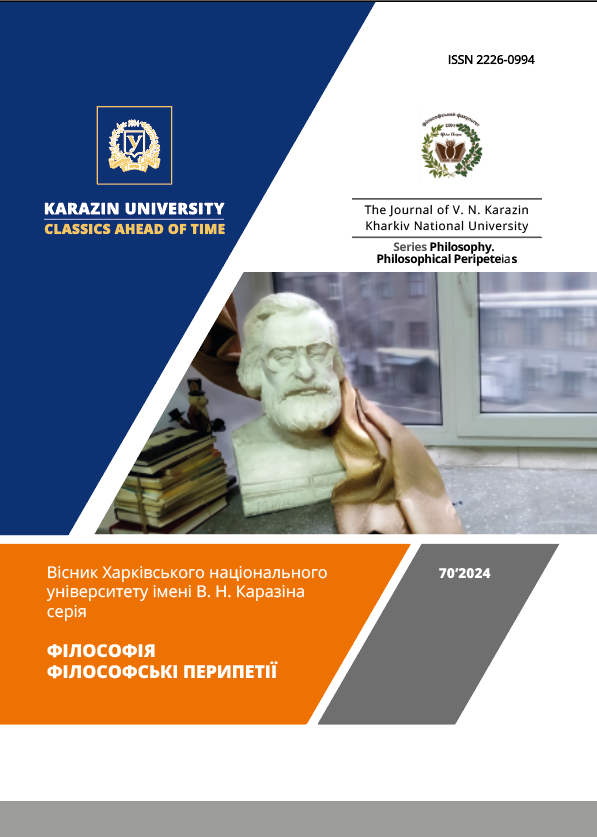ON THE HISTORICAL DISCRETENESS OF THE FUNCTION OF LANGUAGE AND AUTHORSHIP IN THE CONTEXT OF MICHEL FOUCAULT’S “THE ORDER OF THINGS”
Abstract
The article analyzes forms of authorship that were characteristic of Western culture at specific periods and emerged or disappeared in connection with the emergence or disappearance of the corresponding function of language. The analysis was carried out based on the materials and methodology proposed by Michel Foucault in his fundamental work "The Order of Things," involving the works of other researchers. It is noted that the discreteness of the function of language in culture, as proven by Foucault, undermines not only the notion of the foundational function of the subject but also the notion of the invariance and universality of the author's function. Based on descriptions of the function of language within each of the three "epistemes," it is demonstrated that in different periods of the history of Western culture, "authorship" was understood as various cultural practices that are difficult to reduce to a single concept. In conclusion, three types of authorship that emerged in Western culture during different historical periods were identified, named, and described: "Author-Augur" (late antiquity – mid-17th century), "Author-Creator" (mid-17th century – early 19th century), and "Author-Medium" (early 19th century – 20th century). The article argues that the "death of the author," in the context of "The Order of Things," is a consequence of the decline of the "classical episteme" – conditions of the possibility of knowledge in which "representation" was the only locus of the world's existence, and under the Cartesian "cogito ergo sum," according to Foucault, what was actually implied was: "I think, therefore the world exists." After it was revealed within the "modern episteme" that the being of man is outside the being of language, the classical Creator was replaced by the Medium. The text separately explains how the proposed concept of the "Medium" fundamentally differs from the "Scripter" (Roland Barthes) and from the so-called "Simple Performer of Pure Ritual" (Michel Foucault).
Downloads
References
Benveniste, É. (1973). Indo-European language and society (E. Palmer, Trans.; S. L. Lieberman, Ed.). Coral Gables, FL: University of Miami Press.
Blanchot, M. (1982). The space of literature (A. Smock, Trans.). Lincoln, NE, London, UK: University of Nebraska Press.
Foucault, M. (1969). L'archéologie du savoir. Paris, France: Gallimard.
Foucault, M. (1966). Les mots et les choses. Paris, France: Gallimard.
Freud, S. (1916). Leonardo da Vinci: A psychosexual study of an infantile reminiscence (A. A. Brill, Trans.). New York, NY: Yard.
Genette, G. (1969). Figures (Vol. 2). Paris, France: Editions du Seuil.
Jacobson, R. (1960). Closing Statement: Linguistics and Poetics. In T. A. Sebeok (Ed.), Style in language (pp. 350-377). Cambridge, MA: The Technology Press of Massachusetts Institute of Technology, & New York, NY; London, UK: John Wiley and Sons.
Mallarmé, S. (1914a). Poesis (C. Maurras, Ed.). Paris, France: Nouvelle Revue Française.
Mallarmé, S. (1956). Selected prose poems, essays and letters (B. Cook, Trans.; H. Mondor, Ed.). Baltimore, MD: The Johns Hopkins Press.
Mallarmé, S. (1914b). Un coup de dés jamais n'abolira le hasard. Paris, France: Nouvelle Revue Française.
Shakespeare, W. (1986). Hamlet, prince of Denmark (L. Hrebinka, Trans.). In Shakespeare, W. Collected works in six volumes: Volume 5 (pp. 5-118). Kyiv, Ukraine: Dnipro. (In Ukrainian).
Copyright (c) 2024 Олександр Лойко

This work is licensed under a Creative Commons Attribution 4.0 International License.
Authors who publish with this journal agree to the following terms:
- Authors retain copyright and grant the journal right of first publication of this work under the terms of a license Creative Commons Attribution License 4.0 International (CC BY 4.0).
- Authors are able to enter into separate, additional contractual arrangements for the non-exclusive distribution of the journal's published version of the work (e.g., post it to an institutional repository or publish it in a book), with an acknowledgement of its initial publication in this journal.
- Authors are permitted and encouraged to post their work online (e.g., in institutional repositories or on their website) prior to and during the submission process, as it can lead to productive exchanges, as well as earlier and greater citation of published work.






3.gif)




